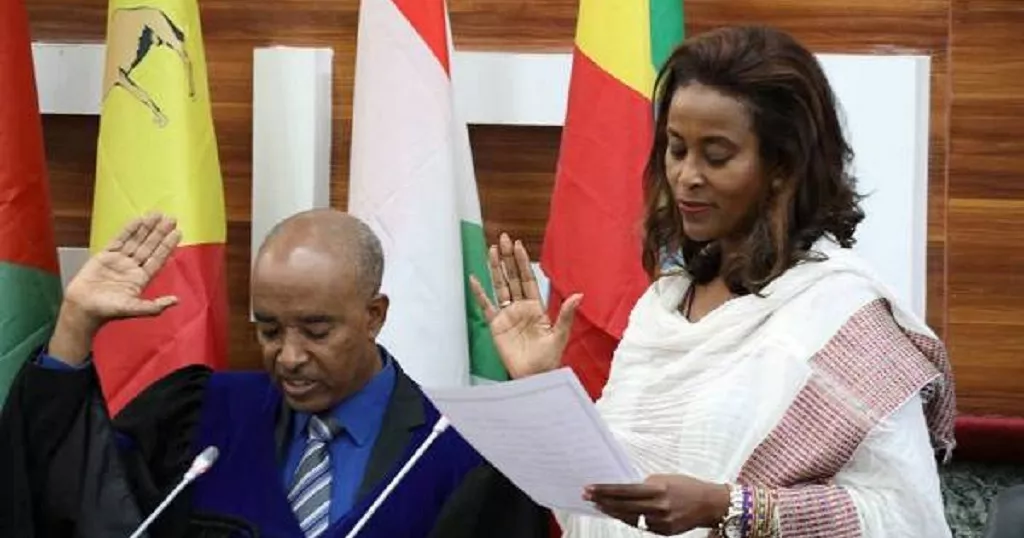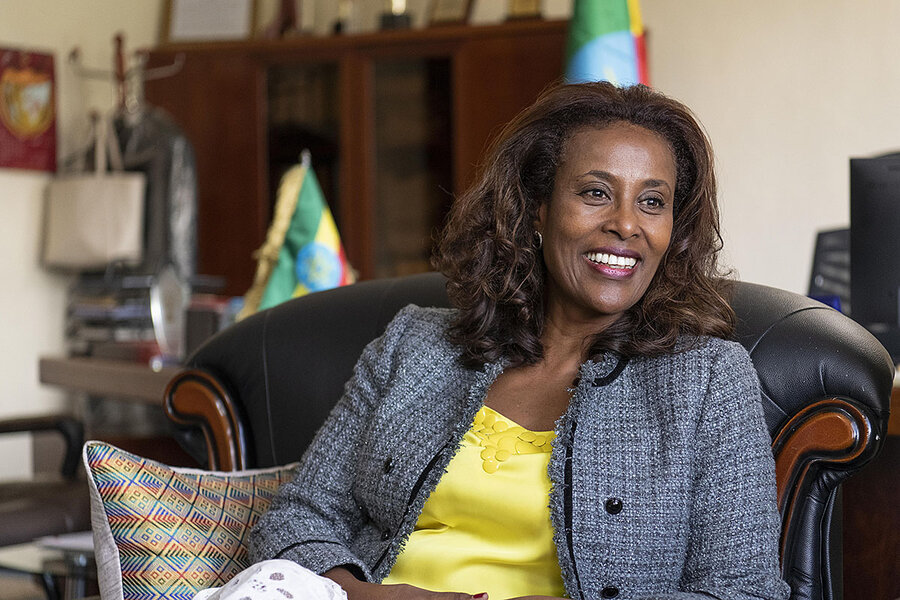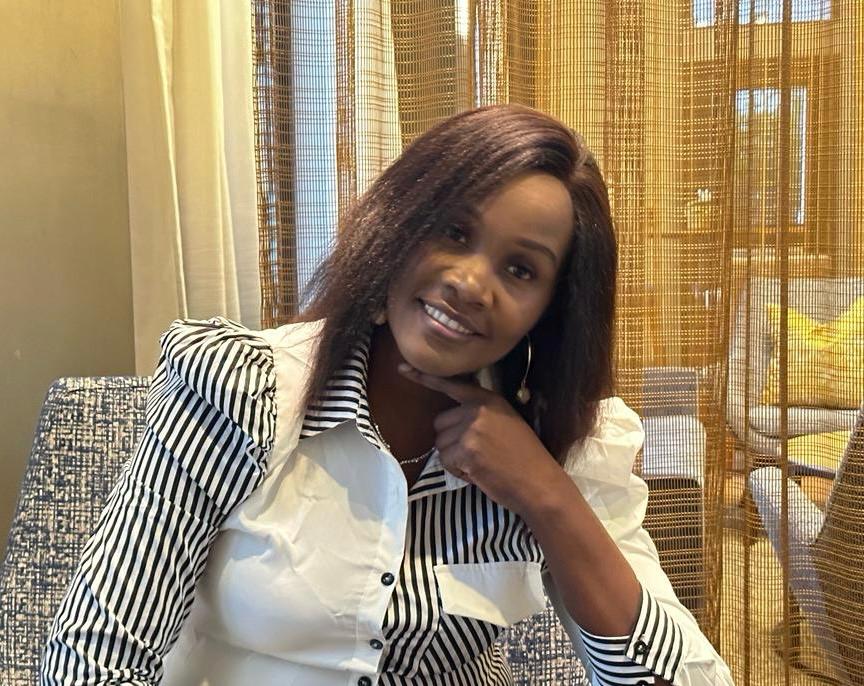Meaza Ashenafi, Ethiopia’s first female Chief Justice, blazes trails through legal advocacy. Co-founding the Ethiopian Women’s Lawyers Association (EWLA) after being the sole female graduate from her law class, she witnessed gender discrimination firsthand as a criminal court judge.
Her historic work with EWLA led to the fight against discriminatory laws, introducing terms like ‘Sexual Abuse’ and ‘Sexual Harassment’ in the Amharic Language. Meaza also co-founded Enat Bank, addressing the financial gap for women.
“Leadership means envisioning and pursuing it. Women can achieve despite societal pressures. Believe in yourself to make a difference,” Chief Justice Meaza asserts, championing empowerment despite obstacles.
Early Life of Meaza Ashenafi
Meaza Ashenafi, born on July 25th, 1964, in Assosa, a small town now the capital of Benishangul-Gumuz regional state in Ethiopia, hails from a modest background. Her father, Ashenafi Mengistu, served as Assosa’s mayor, while her mother, Askalech Tegegne, managed a bustling household and raised nine children, instilling values of honesty and fairness in Meaza.
Despite lacking formal education, her mother encouraged Meaza to excel academically, fostering a thirst for learning and a determination to confront injustice. Meaza’s journey led her to Addis Ababa University’s law school in 1981, where she was one of only a few women among fifty students, a challenging but growth-filled experience.
Career Growth of Meaza Ashenafi

Graduating in 1986, she initially worked at the Ministry of Trade before transitioning to the judiciary through a recruitment program. As a judge on the Federal High Court Criminal Bench from 1989 for five years, Meaza witnessed firsthand how the law and its implementation discriminated against women, fueling her drive for change.
In 1993, Meaza joined the Human Rights Committee of the Ethiopian Constitution Drafting Commission. She contributed significantly to drafting strong protections for women’s and children’s rights in Ethiopia’s current constitution. Her training in The Hague broadened her understanding of international human rights and connected her with African women advocating for women’s rights.
Following her work with the constitution drafting commission, Meaza co-founded the Ethiopian Women Lawyers’ Association (EWLA) in 1995 alongside Atsedewoyin Tekle and other women lawyers. Serving as the association’s Executive Directress for eight years, EWLA aimed to safeguard women’s economic, political, social, and legal rights. Under the strict guidance of Ethiopia’s Constitution and international human rights conventions.
Meaza Ashenafi and the EWLA team orchestrated substantial amendments to national laws, notably impacting family, criminal, labor, citizenship, and pension laws in favor of women’s rights. Their influence led to crucial changes, including criminalizing domestic violence and female genital mutilation, actions previously unrecognized by Ethiopian law. They even had to create the phrase “yesetoch teqat” in the official language to describe violence against women.
EWLA’s efforts extended to opening centers providing free legal advice for women in Addis Ababa and regional towns. This was under the guidance of approximately 60 volunteer paralegals. Meaza’s leadership supported over 100,000 women, representing them in significant cases involving abduction and harmful traditional practices.
The High Profile Case of 14-Year-Old Girl
One high-profile case involved a 14-year-old girl defended by Meaza/EWLA. This is after she fatally shot a man attempting to abduct and marry her. This story inspired the 2014 Ethiopian film “Difret,” with Angelina Jolie as executive producer. It depicted Hirut (the victim represented by Meaza/EWLA) pleading self-defence. The film received the ‘Audience Award: World Cinema Dramatic’ at the 2014 Sundance Film Festival.
Other Accolades of Ethiopia’s First Female Chief Justice
After her time at EWLA, Meaza led the Inter-Africa Group, where she helped organize discussions between different political parties. Most notable include during Ethiopia’s 2002 national election. In 2005, she received a scholarship from UNESCO to study International Relations at the University of Connecticut in the USA. From 2011 to about 2017, she advised the Gender and Social Policy Development Department at the United Nations Economic Commission for Africa (UNECA). During this time, Meaza volunteered to establish Enat Bank, the first bank in Ethiopia initiated and managed by women. Enat Bank, translating to ‘mother bank,‘ began operations in 2014. She chaired its Board of Directors until she was appointed Chief Justice in 2018.
Throughout her career, Meaza received various awards for her dedication to promoting women’s rights. In 2003, she was honored with the Hunger Project African Leadership Prize for her unwavering commitment. She often credits her husband’s support and emphasizes the significance of teamwork for her success.
President of the Federal Supreme Court in 2018
The appointment of Meaza Ashenafi as President of the Federal Supreme Court in 2018 marked a significant milestone in Ethiopia’s history. Meaza Ashenafi aims to rebuild public trust in the judiciary and enhance gender equality within the court system. Under her leadership, more women were appointed as judges. In addition, plans are in place to establish a women judge’s association for mentoring and growth.
Beyond being the first woman appointed as Chief Justice, Meaza’s achievements, from her early strides in law school remain impeccable. Her advocacy for women’s rights and the establishment of Enat Bank, solidify her as a pioneering figure in Ethiopian society. Her commitment to justice and readiness to tackle challenges underscore her selection as a trailblazing figure.



